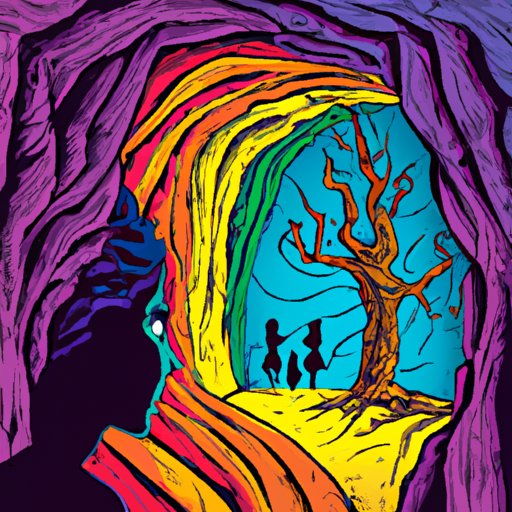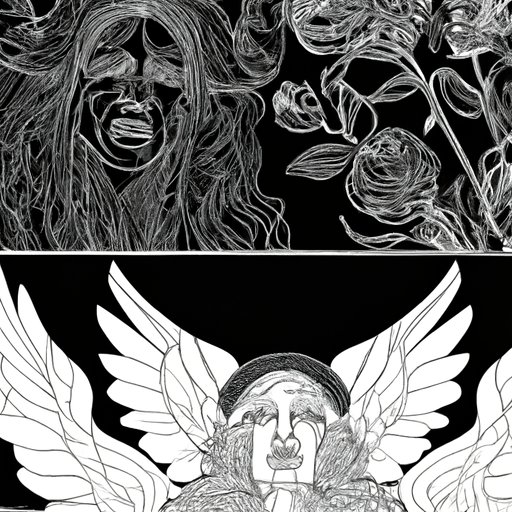I. Introduction
Studying cultural beliefs and values is essential for understanding the history, customs, and worldview of a society. One way in which these beliefs and values are expressed is through mythology. Myths are stories that have been passed down through generations, often incorporating supernatural or mystical elements. These stories reflect the cultural beliefs, values, and experiences of a society, and offer insights into their identity, worldview, and traditions. This article examines the ways in which myths reflect cultural beliefs and values, explores the connection between myths and cultural identity, and considers the ongoing influence of mythology on modern literature and popular culture.
II. The Importance of Mythology in Understanding Cultural Beliefs and Values
Myths serve as a way for a culture to explain and understand the world around them. They often involve gods, heroes, and mystical creatures, and convey a society’s understanding of the origins of the world, the nature of humanity, and the forces that govern life. By examining myths, we gain valuable insights into the cultural beliefs and values of a society.
For example, Greek mythology features a pantheon of gods and heroes who embody the ideals of beauty, strength, and heroism. These figures reflect the values of Ancient Greek society, which placed great emphasis on physical strength, intellectual prowess, and bravery. Similarly, Native American myths often feature animal spirits, which represent the interconnectedness of all living things and the importance of respecting the natural world.
III. Exploring the Connection between Myths and Cultural Identity
Cultural identity refers to the shared beliefs, practices, and customs that define a group of people. Myths are an essential part of cultural identity formation, as they help to communicate a group’s history and beliefs. By passing down stories, myths, and legends, a culture reinforces its identity and traditions.
The stories we tell ourselves about our origins and history shape our understanding of who we are as individuals and as members of a larger community. For example, in the Hindu epic, the Mahabharata, the story of the warrior Arjuna reflects the importance of duty and selflessness in Indian society. Similarly, in African mythology, the creation story of Anansi the Spider conveys the importance of wisdom and wit in overcoming obstacles.
IV. How Myths Shape and Reflect Society’s Values and Traditions
Society’s values and traditions are shaped by a variety of factors, including religion, politics, and culture. Myths reflect and shape these values and traditions in a number of ways. They can serve as a form of social control, reinforcing norms and expectations, or they can inspire individuals to challenge the status quo.
Throughout history, myths have impacted society’s values and traditions in profound ways. For example, the biblical story of Adam and Eve has influenced Western understandings of sexuality and gender roles for centuries. The story of the Trojan War, as recounted in Homer’s Iliad, has been used as a metaphor for the horrors of war, inspiring anti-war movements throughout history.

V. Unraveling the Meaning behind Popular Mythological Narratives
Popular mythological narratives have been interpreted in many different ways over time. For instance, the story of Persephone, who is abducted by Hades and forced to spend part of each year in the underworld, has been viewed as a coming-of-age story, a reflection of seasonal changes, and a metaphor for the loss of innocence.
Understanding the meaning behind these narratives is important for understanding cultural beliefs and values. By considering the symbolism and messages of popular myths, we can gain insight into the beliefs and values of a society. For example, the story of the dragon-slaying hero is a common theme in stories from around the world, reflecting the universal human desire to conquer fear and adversity.
VI. Understanding the Symbolism and Significance of Myths in Different Cultures
Myths are often highly symbolic, using images and characters to convey deep-seated beliefs and values. By understanding the symbolism behind myths, we can gain a deeper appreciation for the cultures that created them.
For example, in Egyptian mythology, the goddess Isis is often depicted with cow horns, which symbolize fertility and abundance. In Hindu mythology, the god Shiva is depicted holding a trident, which represents his power to destroy ignorance and illusion.
VII. The Role of Myths in Preserving and Passing Down Cultural Heritage
Cultural heritage refers to the customs, traditions, and artifacts that define a particular community’s history and identity. Myths play an important role in preserving and passing down cultural heritage, as they serve as a way to communicate the shared experiences and beliefs of a culture.
For example, African American culture has a rich tradition of storytelling, which includes myths and legends that have been passed down through generations. These stories serve as a way to preserve the history and traditions of African American communities, and to share these stories with future generations.
VIII. Why Myths Continue to Influence and Inspire Modern Literature and Popular Culture
Myths continue to have a significant impact on modern literature and popular culture. They offer timeless stories and archetypes that resonate with audiences across time and space.
For example, J.K. Rowling’s Harry Potter series draws heavily on mythological themes, such as the hero’s journey, the battle between good and evil, and the power of magic. The Star Wars franchise also draws heavily on mythological themes, such as the hero’s journey and the call to adventure.
IX. Conclusion
The study of myths offers valuable insights into cultural beliefs and values. By examining the ways in which myths reflect cultural identity, shape society’s values and traditions, and preserve cultural heritage, we can gain a deeper appreciation for the customs and beliefs of different cultures. Furthermore, understanding the symbolism and meanings behind popular myths allows us to engage with these stories in a meaningful way, and to appreciate their ongoing influence on modern literature and popular culture.
It is important to continue exploring and learning about different myths, as they offer a unique window into the human experience, and the beliefs and values that shape our societies.
(Note: Is this article not meeting your expectations? Do you have knowledge or insights to share? Unlock new opportunities and expand your reach by joining our authors team. Click Registration to join us and share your expertise with our readers.)
